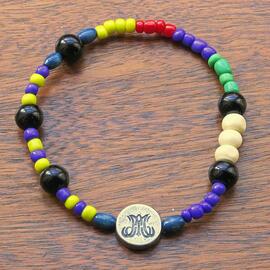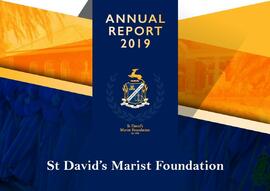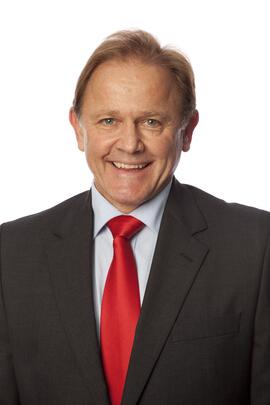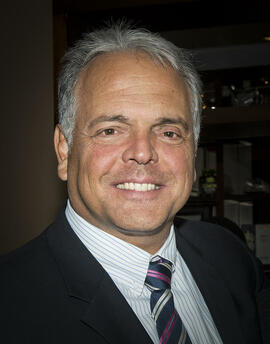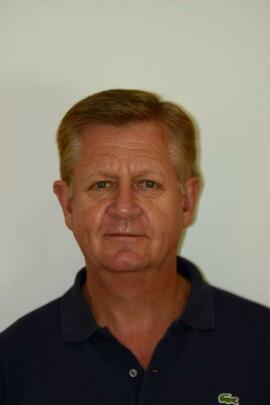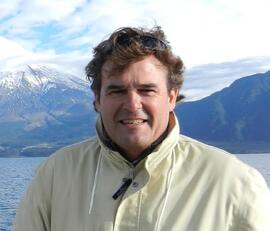2015 75th Jubilee Circle of Friendship - Explanation
- ZA ZAR STDS 202000967
- Item
- 2015
75th Jubilee Circles of Friendship
The 75th Jubilee Circles of Friendship campaign was designed to link the parents, staff, boys,
and Old Boys as a community in long-term relationship and giving campaign, to
commemorate the 75th Jubilee year and carry through to the 80th Jubilee.
The aim of the Circles is to connect the entire St David’s community through interconnected
circles of giving reflecting all the areas of connectedness and involvement at St David’s; the
Montagne Day Pledge was the start of initiating the boys’ Circles of Friendship which will
continue.
The Campaign was initially introduced towards the end of 2015 when the entire School
received the Circles of Friendship Bracelet with an accompanying explanation, the campaign
was promoted through various forums and mediums to parent, staff and Old Boys throughout
2016 (including throught the Coffee and Donuts Sessions – each of which covered a different
area of interest and activity at St David’s), with the final ‘activation’ being with the St David’s
boys through the Montagne Day Pledge initiative. A google form link was also shared with
the community where circles could register and indicate their area of support and how they
would be contributing to their Circle (ranging from monthly to annual contributions or
contributions on an ad hoc if they had decided to engage in fundraising activities – which
some Circles seemed to favour). The Willy Castle Marathons Campaign (which this year will
enter its third year) also became a focus for a Circle amongst those who support this initiative.
Montagne Day Pledges
The 75th Jubilee year celebrations formally concluded with the celebration of Montagne Day
Mass on Friday 28 October which marked the 200th Anniversary of the visit of St Marcellin
Champagnat to the bedside of the dying 16 year-old Jean-Baptiste Montagne, an incident
which profoundly affected St Marcellin and inspired him to found the teaching order of
Marist Brothers. Each boy was asked to make a Montagne Day Marist Pledge, and to
accompany this by donating R 75 towards the 75th Jubilee Circles of Friendship Campaign,
raised through his own efforts and acts of service. These donations form the start of each
year group’s own Jubilee Circles of Friendship as per the Matric Years that they will
eventually become, for example, those boys who were in Grade 6 last year will be the
Matric Class of 2022. The funds raised go towards a bursary for an underprivileged boy (a
modern-day Montagne) – the Grade 5s, led by Mr Byron King, decided to take part in the
94.7 Mountain Bike Challenge on 13 November 2016 to raise additional funds in support of
their Montagne Day Pledges towards this bursary.
As part of the Mass the photo composite of St Marcellin Champagnat was unveiled and
blessed – below is the explanatory speech that I gave at the Montagne Day Mass:
Montagne Offertory – Photo Montage Explanation
Friday 28 October 2016
Last year, whilst Mrs Klement and I were contemplating ideas and doing online research for
the St David’s 75th Jubilee Circles of Friendship campaign and the Jubilee Bracelet, I came
across a beautiful photo composite of St Marcellin Champagnat that had been created by
Marist High School in Chicago, USA. The face of St Marcellin had been created using
photographs of the students and staff of the Marist High School and I loved the idea and
thought that this would be an excellent way for us at St David’s to celebrate and remember
our 75th Jubilee Year for many years to come and to reflect the Circles of Friendship that
were formed at this time. To have the face of our Founder made up of all of our faces also
reflects where our Marist roots come from and how we, as the St David’s community,
continue to carry forward the ethos, vision, work and legacy of St Marcelllin Champagnat
200 years after he founded the Marist Brothers teaching order. We used the Chicago
photograph on the cards that accompanied the Jubilee Bracelets that we all received last
year and then spoke with Mr Rose-Reddiar to see if he could work his photographic magic to
create our very own St David’s image. He has been working throughout this year to compile
the photo montage from our individual photographs and photos taken at the Jubilee
celebrations and other events through this year, for which we most sincerely thank him –
and today we get to see our very own montage for the first time, which will be blessed and
then permanently displayed at St David’s.
Fiona Budd
Foundation Manager
St David’s Marist Foundation
(The St David’s St Marcelin Photo Montage can be seen on the wall in the foyer of the
Champagnat Hall)
Original Introduction to the 75th Jubilee Circles Campaign (comms from January 2016)
Become part of the legacy of the St David’s Marist Inanda 75th Jubilee by joining the St
David’s Marist Inanda Circles of Friendship Initiative
As part of the 75th Jubilee Celebrations St David's has launched the '75th Jubilee Circles of
Friendship' Campaign - Connecting our Community. One of the aims is to explore and map
how the entire St David's community is connected, through a network of individual circles of
mutual interest to form an interwoven 'tapestry' of connection, reflecting and
commemorating the 75th Jubilee Community.
The St David’s Marist Foundation Trustees have begun the first Circle and you are invited to
initiate or join a Circle of Friendship at St David’s, with relevance to you.
The 'Circles of Friendship' initiative has also been established as a form of Giving Circle
participatory philanthropy where each Circle will be invited to agree to a monthly, termly or
annual giving commitment of their choice to the St David's Jubilee Fund (connected to an
area of common interest, for example, cricket development at St David's) and to honour this
commitment for the next five years, until the 80th Jubilee. As an illustrative example, if a
Circle commits to a joint giving contribution of R 1 200 per year over 5 years this will amount
to R 7 500 - a lovely 'echo' of the Jubilee Year number.
The Jubilee Fund will primarily support Bursary and Development Funds (including sports,
cultural, academic and leadership development) with the major capital development
fundraising drive being in support of enabling the building of 'The Maristonian' - a multipurpose
Education facility, which will include a 'home-base' for our Alumni (Old Boys, Past
Parents and Past Staff).
You can form or join as many Circles as you wish to reflect your involvement at St David's - a
giving commitment is only required for the initial Circle that you join or form.
75th Jubilee Circles in place as at 31 December 2016
St David's 75th Jubilee Year Circles
50 Circles
General Circles
St David's Book Club Circle (Cultural Development)
St David's Friends of the Arts Circle (Maristonian)
Tuckshop Mom's Circle
Mothers' Prayer Group Circle
Hands of Champagnat Circle (Community Development)
Basketball Parents' Circle (Sports Dev)
Foundation Trustees Circle
Staff Giving Bursary Circle
Christmas Giving Campaigns Circle (2015 & 2016)
Willy Castle Marathons' Circle 2016
Montagne Day 2016 Pledges (Matric Class Year Circles)
Grade 00 (Class of 2029)
Grade R (O) (Class of 2028)
Grade 1 (Class of 2027)
The Story of the
St David’s 75th Jubilee Bracelet
The disc:
Depicts the Marist Symbol for Ave Maria, St David’s name
and 75 for the Jubilee Year
Three ivory beads:
Represent the Three Characteristics of the Marist Way:
Simplicity, Modesty and Humility
Five Navy blue beads:
Represent the Marist Values of Presence,
Love of Work, Simplicity, Family Spirit, in Mary’s Way
The Green, Red, Blue and Yellow beads represent the four houses of St
David’s: Benedict, College, Osmond and The Bishops
The three sets of alternating blue and yellow beads represent the three
terms of the year at St David’s, and together represent the full year
(and a full year of Circle of Friendship Giving)
The five large black beads represent the Boys, Parents, Staff,
Old Boys and the St David’s community
The pale blue beads in the medium and large bracelets
represent excellence - the colour that is used in the
St David’s Honours blazer
Grade 2 (Class of 2026)
Grade 3 (Class of 2025)
Grade 4 (Class of 2024)
Grade 5 (Class of 2023)
Grade 6 (Class of 2022)
Grade 7 (Class of 2021)
Grade 8 (Class of 2020)
Grade 9 (Class of 2019)
Grade 10 (Class of 2018)
Grade 11 (Class of 2017)
Grade 12 (Class of 2016)
Class of 2015
Maristonian Class Year Circles (Old Boys)
Class of 2010
Class of 2008
Class of 2006
Class of 2003
Class of 2001
Class of 2000
Class of 1996
Class of 1995
Class of 1988
Class of 1987
Class of 1986
Class of 1985
Class of 1980
Class of 1974
Class of 1973
Class of 1972
Class of 1971
Class of 1970
Class of 1968
Class of 1966
Class of 1963
Class of 1962
Class of 1958
Class of 1957
Class of 1950
Excerpt from the Advancement Manager’s Report (November 2016)
Lara Klement
Coffee and Donut Circles of Friendship Mornings
Fiona successfully organized seven Coffee and Donut mornings through the year, each with a
specific focus e.g. Sports and Cultural Activities, Outreach, Old Boys, etc. A number of Circles
have been initiated this year, with some being more ‘fundraising’ focused than others.
However, the idea of connecting around something parents feel passionately about has taken
root in all of them and the ideas of how to raise funds through these have been very
innovative. The process has been an interesting and informative one with some important
learnings:
For many of the people who have come to the coffee mornings, the primary motivation is the
desire to connect with others in the St David’s community or with the School itself. They are
looking for ways to be ‘closer’ to the School (for various reasons) and be involved in one way
or another. We believe that if we (the Foundation) can facilitate this ‘connection’, this
strengthened relationship between parents and school will translate into benefit for the
Foundation over time as well as reap rewards for the school in the shorter term, if managed
effectively.
The true definition of philanthropy is still new in our community’s space. A number of people
have approached the Circles of Friendship with either a charity or a purely fundraising
mindset, each of which brings a very different ‘energy’ and different set of expectations.
Managing this understanding and process as well as the expectations has been very time
consuming, but has given us valuable insight into the mindset of some of our community and
has also allowed us the opportunity to try and shift the mindset to one that is more
philanthropic.
Most Circles have preferred to raise funds rather than just commit to a monthly giving
programme. We think that the reasons are two-fold:
There is still a strong resistance to committing financially over a long period of time.
We think that the uncertainty in our country is contributing to this as families are
preferring to keep as tight a control over their daily finances as possible.
The need to ‘connect’, as mentioned above is a motivating factor for many of the
members and the fundraising projects allow them to do this. However, one of the
Circles, who definitely understand philanthropy, are using this to great effect from a
crowdfunding perspective.
Budd, Fiona

